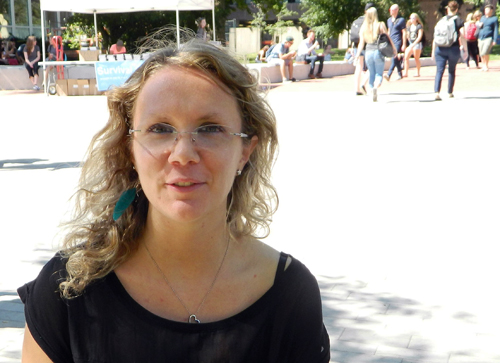
Alessia Ursella never thought of Canada as a place she’d like to live. “I always thought Canada was too cold for me,” she says. “But when I came to the U of G to teach Italian, everyone was so encouraging that I decided to do another PhD here.”
Another PhD? Yes, Ursella had previously completed a PhD at the University of Udine in Italy, followed by a master’s in European studies and a master’s in Italian. Her continued studies were made easier as one of four Trillium Scholarship winners at the University of Guelph. The scholarships are only available to international students in a PhD program; they were created by the Ontario government to bring top students to the province.
Ursella’s current research in contemporary English literature in the School of English and Theatre Studies focuses on connections between literature and society. In this case, she is looking at how American writer David Leavitt and British writer Nick Hornby see the post-modern family.
“The experience of being part of a family is not the same everywhere,” Ursella explains. “These two writers have different perspectives and different writing styles. Both have written not only novels but essay collections, so I can compare those perspectives as well.”
Leavitt has been controversial: his novel While England Sleeps was the subject of a lawsuit by English poet Stephen Spender who claimed that Leavitt had used elements of Spender’s memoir World Within World in the novel. As a result, Leavitt’s publisher withdrew the book and a revised version was printed in 1995 with a preface explaining the controversy.
Ursella says one of the things she likes about studying contemporary literature is that this kind of information is so readily available. “When you research historical literature, you often have to make conjectures about what happened and how people reacted. In Leavitt’s situation, we know how people reacted to the lawsuit and his use of elements of Spender’s memoirs and we don’t have to guess.”
Hornby tends to take a lighter tone in his work, Ursella adds, “not really making fun of things, but just lighter. I am interested in why writers from different societies might choose different tones in their books, and how much the society influences that.”
Ursella’s ultimate goal is to teach and research at a university, but she says she’s “learned to expect the unexpected.” As a child and teenager, she tried to become a writer and still has all the scraps of paper her younger self used to write on. She feels that since she has spent so much time studying and analyzing the writing of others, novel-writing is no longer an option. “I would be too aware, always self-analyzing what I was writing.”
In addition to studying English literature, Ursella loves learning new languages. She speaks English, Italian, Spanish, “pretty good French” and “a little German.” She has also studied Czech and last year audited a course in Chinese. “In Italy, speaking other languages is a key skill for success,” she says. “English is usually the first choice, but most people feel the more languages you can communicate in, the better.”
She notes that in her home country, finding regular full-time employment is difficult. “Every job is a contract,” she says. “I didn’t have holidays for years because I could never predict when my next contract would come up – so I couldn’t plan or book in advance. It’s difficult when you study and work hard but can’t see a positive end result.”
Those experiences have reinforced her feeling that coming to U of G was a good decision. “I like teaching and working with people, and the students who attended my classes last year were very happy with the courses,” she says.
But she is hoping for a warmer winter this year. “I saw more snow last year than in my entire life up until then,” she says. “I figure since it was so horrible last year and I survived it, I can survive anything.”